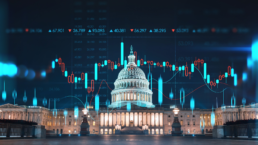Unveiling the profitable pursuits of Congress: a deep dive into lawmakers’ stock market triumphs and the ethical quandaries they pose.
By Ruth Milka, Nation of Change
In 2023, members of the United States Congress significantly outperformed the stock market, according to a revealing report by Unusual Whales, a financial watchdog group. This performance has reignited debate over the ethical implications of lawmakers engaging in stock trading, particularly those whose portfolios include companies impacted by their legislative actions. The report, which meticulously analyzed trading activities of numerous Congress members, disclosed that several lawmakers achieved returns surpassing the S&P 500 Index, a standard benchmark for measuring market performance.

The study by Unusual Whales compared lawmakers’ portfolio returns against the SPDR S&P 500 ETF (SPY), a common benchmark for stock market performance. It found that 32 members of Congress, evenly split between Democrats and Republicans, surpassed the SPY’s growth of 24.81% in 2023. Democratic representatives, on average, saw a 31.18% return, while their Republican counterparts realized a 17.99% increase. Notably, Representative Brian Higgins (D-N.Y.) led with a staggering 238.9% gain, followed by others like Rep. Mark Green (R-Tenn.) and Rep. Garret Graves (R-La.), who also secured significant financial returns.
The revelations in the Unusual Whales report have sparked a flurry of criticism and concerns about potential conflicts of interest. Melanie D’Arrigo, a former Democratic congressional candidate, emphasized that lawmakers should not be permitted to trade stocks in companies they regulate. Nina Turner, a former congressional candidate and senior fellow at the Institute on Race, Power, and Political Economy, echoed this sentiment, labeling such activities as corrupt.
Recent Posts
Why Are Democratic Lawmakers Still Meeting With Netanyahu?
July 12, 2025
Take Action Now Pictures show Democrats like Chuck Schumer standing next to Netanyahu, smiling.By Sharon Zhang, Truthout A bipartisan group of…
Stop Israel’s Dystopian “Humanitarian City” Plan—Before It’s Too Late
July 11, 2025
Take Action Now For the past 20 months, the world has watched—and largely enabled—a genocidal campaign in Gaza. Over 55,000 Palestinians have been…
The “Liberal” International Order Is Criminalizing Palestine Protests
July 11, 2025
Take Action Now As Western governments repress Palestine solidarity and enable Israel’s impunity, the “liberal international order” is no longer…
Politicians Are Betraying Gen Z On Climate
July 10, 2025
Take Action Now While Gen-Zers thrift, knit, crochet, and find other ways to reduce our footprints, Trump and the GOP are greenlighting more climate…




